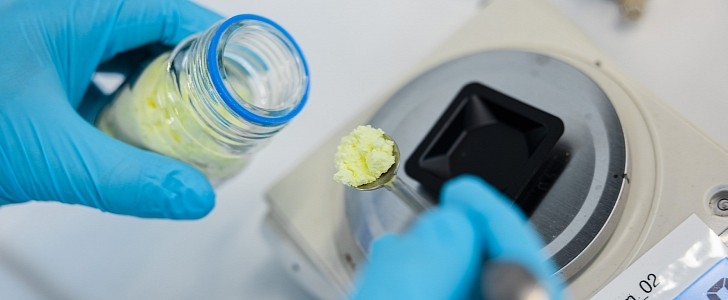Scientists at the University of Houston are confident of overcoming one of the biggest problems preventing solid-state batteries from becoming widespread. Their homogeneous glassy electrolyte paves the way for extremely powerful solid-state sodium-sulfur batteries, which can last for a lifetime.
Li-Ion batteries are now the preferred energy storage for electric vehicles, but they’re far from ideal. Depending on the chemistry, they can be expensive, short-lived, or even explosive in certain situations. But they are relatively easy to manufacture and have a decent energy density, so the carmakers keep using them.
In the light of the raw material price increases due to the supply-chain bottlenecks and the war in Ukraine, the researchers try to find new materials and chemistries. The goal is to replace current battery materials with cheaper and more abundant alternatives to make them sustainable in the long run. This would also help alleviate concerns about high environmental costs and the potential for human rights violations with current mining projects.
You see now why the researchers are hard at work finding new battery chemistries that offer better characteristics than li-ion. Solid-state batteries are said to be the next best thing, promising many advantages over their Li-ion counterparts. They are more stable, eliminating the danger of catching fire and offering an even higher energy density. They can also deliver bigger currents and charge in a fraction of the time it takes Li-ion batteries to replenish.
And yet, despite the many advantages, there is no commercially available solid-state battery. Several companies are trying to advance the tech, including StoreDot and QuantumScape, but no breakthrough has been achieved. The main problem is the electrolyte, which is prone to forming dendrites that kill the battery after only so few recharge cycles. A new study conducted at the University of Houston has found a breakthrough solid electrolyte for use in solid-state sodium-sulfur batteries that eliminates these problems.
Thanks to its ubiquity and low price, sodium is a better alternative to lithium for use in batteries. Sulfur batteries also promise far higher energy densities but come with their own problems, including dendrite and polysulfide formation, making them last only a few charging cycles. But the scientists at the University of Houston think they have solved all these problems with a new miracle solid electrolyte.
“The quest for new solid electrolytes for all-solid sodium batteries must concurrently be low cost, easily fabricated, and have incredible mechanical and chemical stability,” said Yan Yao, Cullen Professor of Electrical and Computer Engineering. “To date, no single sodium solid electrolyte has been able to achieve all four of these requirements at the same time.”
The researchers found a new form of oxysulfide glass electrolyte that has the potential to satisfy all these requirements simultaneously. The material has a distinct microstructure, resulting in an entirely homogeneous glass structure. This allows the solid electrolyte to form a “self-passivating interphase” at the interface between sodium metal and the electrolyte.
This is considered essential for reversible plating and stripping of sodium. Scientists say that it has proven difficult so far to achieve stable plating and stripping of sodium metal when using a sulfide electrolyte.
“Our study overturned this perception by establishing not only the highest critical current density among all Na-ion conducting sulfide-based solid electrolytes but also enabling high-performance ambient-temperature sodium-sulfur batteries,” Yao explained.
This allows for the development of safe, low-cost, energy-dense, and long-lifetime solid-state sodium batteries. The study published in Nature Communications does not necessarily mean that a new sodium-sulfur battery is just around the corner. But it shows that solid-state sodium-sulfur batteries are a viable solution, paving the way for companies to fast-track their development.
In the light of the raw material price increases due to the supply-chain bottlenecks and the war in Ukraine, the researchers try to find new materials and chemistries. The goal is to replace current battery materials with cheaper and more abundant alternatives to make them sustainable in the long run. This would also help alleviate concerns about high environmental costs and the potential for human rights violations with current mining projects.
You see now why the researchers are hard at work finding new battery chemistries that offer better characteristics than li-ion. Solid-state batteries are said to be the next best thing, promising many advantages over their Li-ion counterparts. They are more stable, eliminating the danger of catching fire and offering an even higher energy density. They can also deliver bigger currents and charge in a fraction of the time it takes Li-ion batteries to replenish.
Thanks to its ubiquity and low price, sodium is a better alternative to lithium for use in batteries. Sulfur batteries also promise far higher energy densities but come with their own problems, including dendrite and polysulfide formation, making them last only a few charging cycles. But the scientists at the University of Houston think they have solved all these problems with a new miracle solid electrolyte.
“The quest for new solid electrolytes for all-solid sodium batteries must concurrently be low cost, easily fabricated, and have incredible mechanical and chemical stability,” said Yan Yao, Cullen Professor of Electrical and Computer Engineering. “To date, no single sodium solid electrolyte has been able to achieve all four of these requirements at the same time.”
The researchers found a new form of oxysulfide glass electrolyte that has the potential to satisfy all these requirements simultaneously. The material has a distinct microstructure, resulting in an entirely homogeneous glass structure. This allows the solid electrolyte to form a “self-passivating interphase” at the interface between sodium metal and the electrolyte.
“Our study overturned this perception by establishing not only the highest critical current density among all Na-ion conducting sulfide-based solid electrolytes but also enabling high-performance ambient-temperature sodium-sulfur batteries,” Yao explained.
This allows for the development of safe, low-cost, energy-dense, and long-lifetime solid-state sodium batteries. The study published in Nature Communications does not necessarily mean that a new sodium-sulfur battery is just around the corner. But it shows that solid-state sodium-sulfur batteries are a viable solution, paving the way for companies to fast-track their development.








